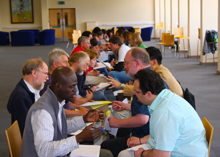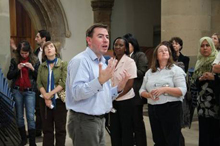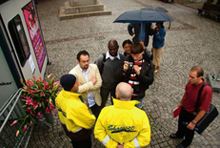iGov2008 Research Institute: International, Interdisciplinary, Innovative

On the first day of the 2008 iGov Research Institute in Manchester, UK, participants sat in two rows of facing chairs and successively interviewed each other on their cultures, academic fields, approaches to research, and desire to have an impact on the changing nature of government.
How do 30 people from 15 different countries get to know each other and learn to work together in just one week? Imagine a scholarly form of speed dating and you will understand the first step in the process of bringing together young scholars and seasoned researchers from all over the world to explore information age challenges for government. On the first day of the 2008 iGov Research Institute in Manchester, UK, participants sat in two rows of facing chairs and successively interviewed each other on their cultures, academic fields, approaches to research, and desire to have an impact on the changing nature of government.. From that lively beginning unfolded a week of site visits, research discussions, group projects, and social networking in which 20 doctoral students and ten faculty, staff, and mentors from around the world considered digital government research problems from an interdisciplinary and cross-cultural perspective. Representing Europe, North and South America, Asia, Africa, and Australia, students came from 15 countries, 13 universities and six academic fields, including Public Policy, Information Science, Computer Science, Sociology, Environment and Architecture, and Organizational Studies.
The underlying goal of the iGov Institute, part of a four-year program at the Center for Technology in Government sponsored by the US National Science Foundation, is to build an international community of researchers interested in international digital government areas. It offers both students and faculty an innovative and integrative opportunity to not only learn from each other, but also to get to know each person’s history, research, culture, and interests and to form long-lasting relationships for the future.

Students visited the Gorton Monastery, a historical site situated in an economically depressed neighborhood where people are working to regenerate both the physical and social structure of the community.
The annual iGov Research Institute is a unique blend of focused lectures; visits and discussions with elected officials, public employees, community organizers, and citizens; and small group projects that aim to help students better understand the role that information and technology can play in solving pressing public problems. Each year, the institute is held in a city that is an international leader in some aspect of digital government. In July 2008, the institute’s second year, students spent time getting to know Manchester’s history and future through the theme of urban regeneration. To set the stage, Stephen Coleman, internationally known professor of Political Communication and co-director of the Centre for Digital Citizenship at the Institute of Communication Studies at the University of Leeds, provided a keynote lecture on the future research agenda of e-democracy.
Hot button issues in Manchester, such as congestion transportation pricing and social and economic development in an aging urban infrastructure, are shared by cities around the world. To consider the value of conducting research in these topics, students participated in stakeholder analysis exercises and field observations as well as lectures and discussions on theory, research methods, and research-practice partnerships.
Throughout the week, students engaged with individuals in the community in discussion-based site visits that highlighted the local culture and innovative activities taking place in Manchester. Highlights included a day at Gorton Monastery, a historical site situated in an economically depressed neighborhood where people are working to regenerate both the physical and social structure of the community. A half day at the Manchester Digital Development Agency (MDDA) was spent learning about Web 2.0 in local government and Neighborhood Management Systems. MDDA is part of Manchester City Council and supports the regeneration of the city-region through the strategic and practical work of technology-focused projects.

Students used the site visits, Web research, citizen interviews, and other techniques to develop and present their ideas for research on congestion pricing, economic health, and community health and well-being.
The group also visited the offices of the Manchester Community Information Network, a non-profit organization dedicated to increasing social inclusion through information and communication technologies (ICTs). Students had a unique opportunity to listen to and talk with Gary Copitch, director of MCIN. Gary described the challenges and opportunities of developing a local community information infrastructure through innovative projects like People’s Voice Media and LearnNet, and providing information technology services to the community.
The week culminated with three student group presentations on the final day of the institute. The groups, composed of students of different nationalities and academic backgrounds, chose their topics and then throughout the week met to learn about, navigate, and negotiate their differences in order to sketch out a coherent, multi-disciplinary cross-cultural research project of their choosing. Students used the site visits, Web research, citizen interviews, and other techniques to develop and present their ideas for research on congestion pricing, economic health, and community health and well-being. The cross pollination of ideas may prove to be the most valuable result of the Institute whose ultimate goal is to nurture professional collaborations and build a sustainable community of digital government researchers.